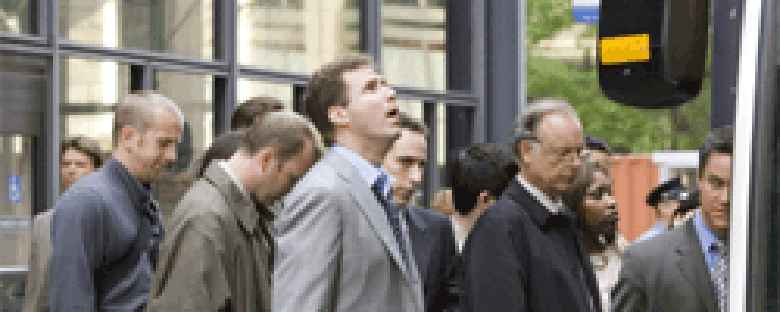Reviews
Marc Forster
USA, 2006
Credits
Review by Tom Huddleston
Posted on 23 October 2006
Source Sony Pictures 35mm print
Related articles
Features: The Times BFI 50th London Film Festival
Hi, I’m Penny. I’m Kay’s assistant.
I’m Harold. I’m her main character.
In cinema, self-awareness is nothing new. Bugs Bunny argued with his animator, Woody Allen winked at his audience, even Arnold Schwarzenegger climbed down from the screen to humiliate himself in the ‘real’ world. But a few years ago the success of Charlie Kaufman’s Adaptation started a new wave of filmic meta-fiction, illustrating the creative process by depicting the struggle between an artist and his creation, elevating the writer to a semi-heroic level, throwing in a layer of dry self-criticism to make the whole thing more palatable.
Stranger Than Fiction, though the work of first time screenwriter Zach Helms, is clearly a child of Kaufman. It has his deprecating wit, his knowing dialogue, his countercultural intelligence. The film’s digitally enhanced visuals recall Eternal Sunshine Of The Spotless Mind, sporting the kind of mid-to-upper range, highly respectable cast that has become de rigeur for this type of story—Emma Thompson standing in for Meryl Streep, Will Ferrell for Jim Carrey. But Kaufman’s scripts are often hampered by a rather flashy awareness (and perhaps overestimation) of their own intelligence—this is not the case with Stranger Than Fiction. The metaphysical aspects here are used in the service of the characters, not the other way around—this is, first and foremost, a human study, a love story, an existential treatise on the inevitability of death and the preciousness of life. It’s also a charming, surprising, admittedly flawed but still rather beautiful film.
Harold Crick is an IRS agent obsessed with numbers who has lived in the precise same routine for almost 12 years. But one morning Harold starts to become aware of a voice in his head, narrating his actions—a female voice, English, and rather bitter. It’s the voice of acclaimed author Kay Eiffel, who is gradually drinking and smoking herself to despair trying to figure out how to kill off her main character, Harold Crick. But Harold is beginning to divine the truth of his existence, and this awareness of impending doom starts to make him act in unexpected ways.
The plot of Stranger Than Fiction is, in essence, complete nonsense. Although Harold is a ‘fictional’ character he somehow manages to exist in the real world, allowing he and Kay to meet in the final act. There’s no explanation given for this, no mystical curses or magical typewriters. Like the portal into Malkovich’s head, it just is. This is perhaps an indicator of a certain laziness on Helms’ part, an unwillingness to connect too intimately with the technical specifics of his created world. But it also serves to allow the characters room to develop—once they’ve accepted the situation they can begin to deal with it. And it’s this struggle that clearly interests Helms, the ‘who am I, what am I, why am I’ generalities that affect us all, but particularly Harold Crick.
Harold is presented to us in Thompson’s voiceover as an anally retentive, borderline catatonic obsessive-compulsive with little in the way of personality or social life. But this description thankfully contrasts with the character we meet on screen—Will Ferrell’s performance is warm and persuasive, the dialogue suitably awkward but indicative of real humanity and intelligence in the character. The romance between Harold and Maggie Gyllenhaal’s anarchist baker Anna is the undisputed highlight of the film—their relationship is giddy but believable, a tentative trip into uncharted territory, reminiscent of the central relationship in Punch-Drunk Love, though without the violent outbursts.
The other key relationship in the film is between Harold and Dr. Julius Hilbert, the literature professor he turns to for advice when the true nature of his predicament becomes clear. As Hilbert, Dustin Hoffman is hardly straining his acting muscles, but this is an enormously likeable, dignified performance, rolling off lists of ludicrous literary questions (“are you the King of anything? King of the lanes?”) with consummate, professional ease.
The film’s weakest scenes are generally those featuring Emma Thompson as Kay, and her ongoing battle with new assistant Penny, played with quiet authority by Queen Latifah. Penny’s role in the film is uncertain, except as a sounding board for Kay’s frustrations—the conflict between them barely serves the plot, and offers little insight into either character. Kay is an intriguing creation- the respected writer who always kills off her heroes. But in Thompson’s rather brittle grip she becomes somehow weak, flailing for ideas, bullied by her publishers and her assistant.
Marc Forster’s direction, though self-conscious, is brilliantly aware of the potential in everyday situations—there’s a gorgeous scene on a bendy bus, with Ferrell bobbing in and out of view while trying to charm Gyllenhaal. The aforementioned digital enhancements — mostly lists of numbers, percentages and charts — make explicit Harold’s ongoing internal calculations, an unnecessary but amusing stylistic tic.
Given its numerous deficiencies, it’s surprising how affecting Stranger Than Fiction actually is. The final act is confidently melodramatic, employing subtle strokes of pathos and nostalgia to skilfully manipulate an audience’s emotions. The film’s big weakness is, ironically, its premise—as a straight romantic comedy in the Woody Allen/ Nora Ephron vein this could have been one of the finest films of the decade, not just the year. As it is, there are too many nagging doubts and plot diversions for the film to be truly satisfying, but it is an extraordinary debut screenplay, a hugely appealing, confident, loveable film that will undoubtedly reward further viewings.
We don’t do comments anymore, but you may contact us here or find us on Twitter or Facebook.



